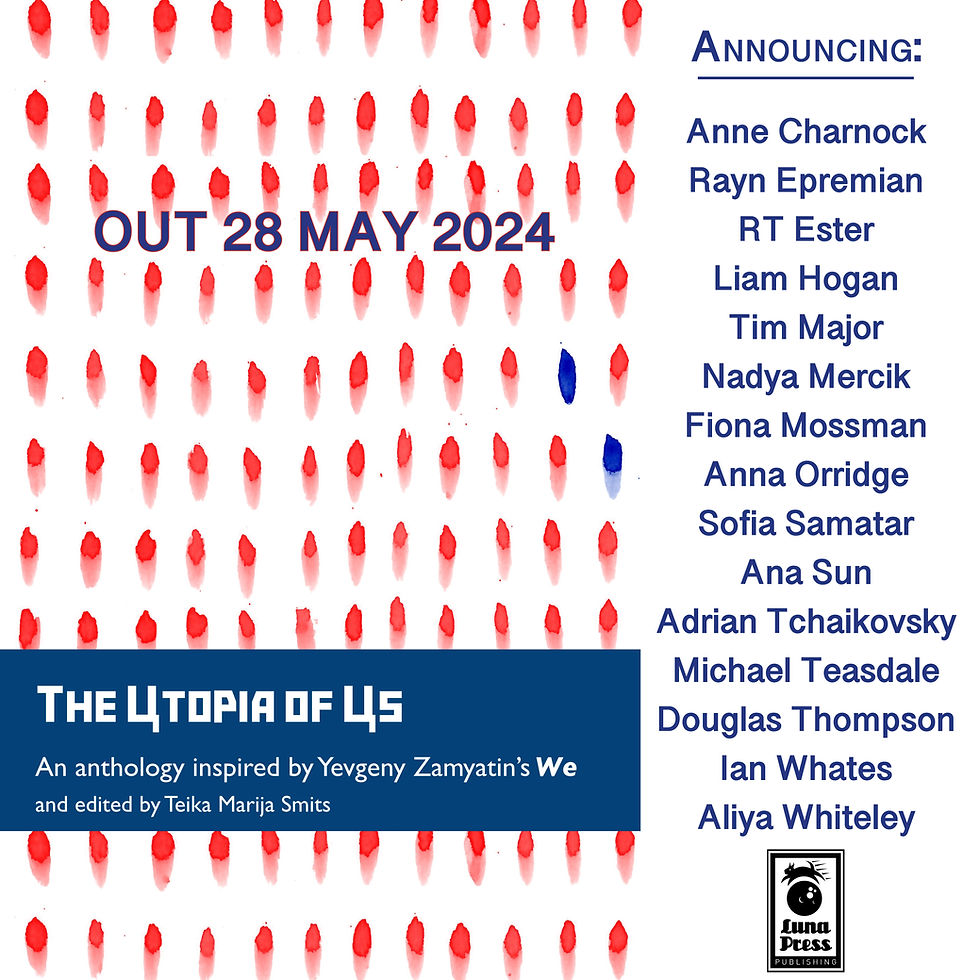
The Utopia of Us anthology is now available for pre-order! Editor Teika Marija Smits has brought together 15 incredible writers and their stories, directly inspired by We by Yevgeny Zamyatin.
It is a charity anthology, and given Russia's current war with Ukraine, royalties from the book will be donated to the Ukraine Humanitarian Appeal.
If you pre-order directly from the Luna website, you will also receive a discount. Check it out!
Today we'd like to introduce you to Aliya Whiteley and the story "Intrinsic – Extrinsic – Terrific".
About the author:
ALIYA WHITELEY lives in West Sussex, UK, and has written novels and novellas that have been shortlisted for multiple awards, including a Shirley Jackson award and the Arthur C. Clarke award. Her latest novel, Three Eight One, was published by Solaris in January 2024. Her short fiction has appeared in many places. Her new collection, Drive or be Driven, was recently published by NewCon Press. She also writes a regular non-fiction column for Interzone magazine.
Aliya on the story:
I first read We a couple of decades ago. I thought about it, I tried to work out what I thought about it, I thought about it, I carried on with the business of being alive, I thought about it, I thought about it, I thought about it. Eventually I decided I’d try reading it again just so I’d stop thinking about it.
That didn’t work.
I’m still thinking about We. It’s one of those books that I wouldn’t call a favourite. It’s been working away on a deep level for a really long time, coming back to me and returning certain images to my mind, such as a city of apartment buildings constructed of glass, and the one ancient opaque house that contains secrets within. Sometimes I think about the emotions instead: of how it would be to live as a number, and order assignations with other numbers through a ticket system. But mainly I think back over the way it rubs together art, science, achievement, longing, desire, morality, and the continuous need to improve. Whatever that means. Am I improving? Are we?
All this makes me uncomfortable. Other dystopias feel more established as perfect, polished systems that end up delivering cruelty by their rigidity. That means rooting for the downfall of the system is the end point to be desired, so there is freedom to begin again. We is awkward in the way it depicts oppression, carried out by the very people who suffer under it. It’s not a story of defined good and evil as end points, but of why such systems exist, and how they grow, shrink, change.
I knew I wanted to write a story for this anthology that captured the bristling, unsettled feeling the novel had sustained in me for all these years when it comes to the effecting of change. I took the images that had stuck with me, and combined them with the elements that had played through my thoughts often. People are in flux, and so is what they want from the system they live within.
I read We yet again recently, and found that some things don’t change. I’m still thinking about it.

More on the anthology:
The year 2024 marks the centenary of the first publication of We, the direct inspiration for George Orwell’s 1984, and many other novels, such as Ursula K. Le Guin’s The Dispossessed and Kurt Vonnegut’s Player Piano.
Strikingly, the Russian novel was first published in English, and in the US. Indeed, it wasn’t until 1988 that it was published in the author’s native country. Clearly, this was a book that the people in power in the Soviet Union wanted erased. Yet it ushered in a new genre – the future dystopia – and in doing so gave birth to the many dystopian novels and films which have found their way into our popular culture.
Setting aside what its publication history says about Russia’s past, it also happens to be a beautifully written and page-turning novel, and one that is still currently relevant since it speaks to the very heart of what it means to be human. In short, the centenary of this wonderful novel should be, and needs to be, celebrated, and how better to do that than by a globally minded, independent press, publishing an anthology of science fiction stories inspired by We?

Comments